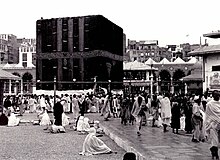| Quran |
|---|

Bakkah (Arabic: بَكَّةُ [ˈbɛk.kɛh]), is a place mentioned in surah 3 ('Āl 'Imrān), ayah 96 of the Qur'an, a verse sometimes translated as: "Indeed, the first House [of worship] established for mankind was that at Bakkah [i.e., Makkah] - blessed and a guidance for the worlds." (Quran 3:96)
According to Muslim scholars Bakkah is an ancient name for Mecca, the most holy city of Islam.[1] (The word Mecca is only used once in the Quran in verse 48:24 ("And it is He who withheld their hands from you and your hands from them within [the area of] Makkah after He caused you to overcome them. And ever is Allāh, of what you do, Seeing."))[2][3][4]
Most Muslims believe Mecca and Bakkah are synonyms, but to Muslim scholars there is a distinction: Bakkah refers to the Kaaba and the sacred site immediately surrounding it, while Mecca is the name of the city in which they are both located.[5]
According to Lisān al-'Arab of Ibn Manẓūr, the site of the Kaaba and its surroundings was named Bakkah due to crowding and congestion of people in the area. The Arabic verb bakka (بَكَّ), with double "k", means to crowd like in a bazaar. This is not to be confused with another unrelated Arabic verb bakā (بَكَىٰ) (single k) which is the past tense of yabkī (يَبْكِي), to cry.
- ^ Barbara Ann Kipfer (2000). Encyclopedic dictionary of archaeology (Illustrated ed.). Springer. p. 342. ISBN 978-0-306-46158-3.
- ^ Surah Al-Fath 48:24 -Sahih International
- ^ Cite error: The named reference
Versteeghp513was invoked but never defined (see the help page). - ^ Cite error: The named reference
Hittip6was invoked but never defined (see the help page). - ^ Oliver Leaman (2006). The Qur'an: an encyclopedia (Illustrated, annotated, reprint ed.). Taylor & Francis. p. 337. ISBN 978-0-415-32639-1.